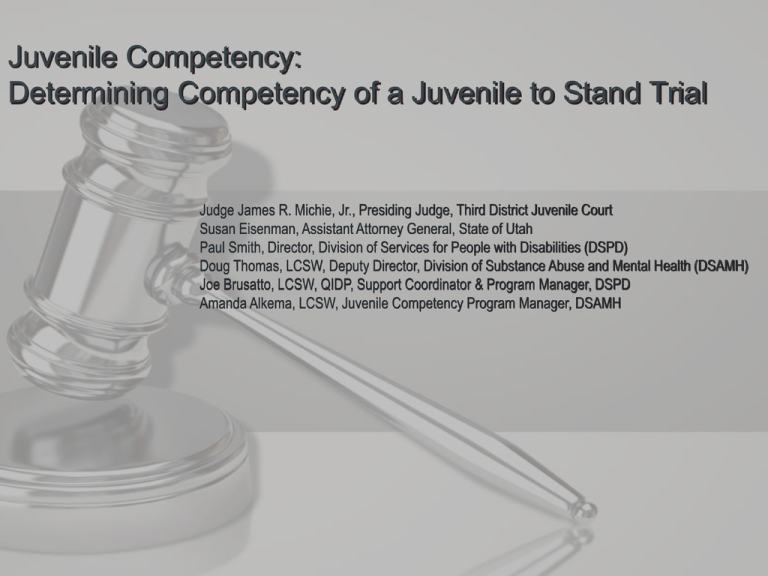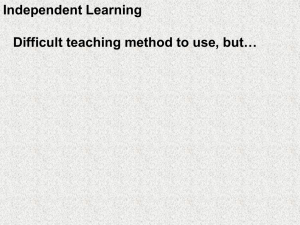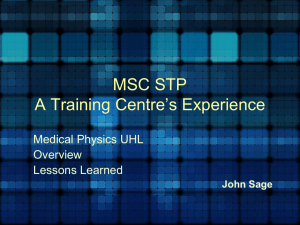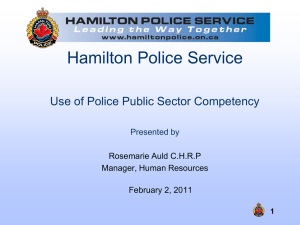Juvenile Competency Evaluation Court Order
advertisement

Juvenile Competency: Determining Competency of a Juvenile to Stand Trial Judge James R. Michie, Jr., Presiding Judge, Third District Juvenile Court Susan Eisenman, Assistant Attorney General, State of Utah Paul Smith, Director, Division of Services for People with Disabilities (DSPD) Doug Thomas, LCSW, Deputy Director, Division of Substance Abuse and Mental Health (DSAMH) Joe Brusatto, LCSW, QIDP, Support Coordinator & Program Manager, DSPD Amanda Alkema, LCSW, Juvenile Competency Program Manager, DSAMH House Bill 393: Juvenile Competency Amendments During the 2012 General Session of the Utah State Legislature, the Juvenile Court Act was amended regarding issues of juvenile competency to participate in legal proceedings, which created a new Juvenile Competency Statute in the form of House Bill 393. “This bill enacts standards and procedures for juvenile competency proceedings, clarifies duties and responsibilities of the Department of Human Services, defines terms, and makes technical corrections” (State of Utah, 2012) Legal Standard for Competency to Stand Trial (Dusky v. 362 U.S. 402, 1960) The Dusky Case established the standard for a criminal defendant to be “competent to proceed”: A defendant must have: …sufficient present ability to consult with an attorney with a reasonable degree of rational understanding… …and a rational as well as a factual understanding of the proceedings against them… H.B. 393 extends the right to be “competent to proceed” to juveniles in delinquency proceedings. Competency Evaluation and Court Order Initiating Motion for Competency Evaluation: • Initial petition for inquiry into competency in delinquency proceedings may be initiated by: minor alleged not competent to proceed; any person acting on the minor’s behalf; prosecuting attorney; guardian ad litem; or any person having custody or supervision over the minor. Utah Code Annotated (UCA) 78A-61301(3). • Petition must raise a “bona fide” doubt as to Juvenile’s competency to proceed. Juvenile Competency Evaluation Court Order : • An order for DHS to perform a juvenile competency evaluation should be separate or specified clearly in Court Order. • Pursuant to UCA 78A-6-1302(6), the minor’s parents or guardian, the prosecutor, defense attorney, and guardians ad litem, shall cooperate in providing the relevant information and materials to the examiners. • Court Order may include a request for prosecuting, defense and guardian ad litem attorneys, parents/guardian or others acting on the minor’s behalf to submit supporting documents to expedite the process. Collateral Information • • • Pursuant to UCA 78A-6-1302(5), the petitioner or other party, as directed by the court, shall provide all information and materials to the examiner relevant to a determination of the minor’s competency including: a) The motion; b) The arrest or incident reports pertaining to the charged offense; c) The minor’s known delinquency history information; d) Known prior mental health evaluations and treatments; and e) Consistent with 20 U.S.C. Sec. 1232G (b)(1)(E)(ii)(1), records pertaining to the minor’s education. In 2009, Kruh & Grisso noted, “The remedial analysis requires consideration of developmental and mental health history, current mental status, information regarding past responses to pharmacological and psychotherapeutic efforts to reduce relevant symptoms, and the past responses to education interventions (Grisso, 2005).” Email all Competency Evaluation Court Orders and supporting documentation pertaining to juvenile competency to: jvcompcor@utah.gov. Assigning Forensic Evaluator • • • • • Competency Evaluation Orders are received by DHS and an evaluator will be assigned by DHS within 48 hours upon receipt of the order and supporting documentation. DHS contracts with forensic evaluators to provide the competency evaluation. Pursuant to UCA 78A-6-1302(4), the minor shall be evaluated by a mental health examiner with experience in juvenile forensic evaluations and juvenile brain development and will be assigned by DSAMH. If it becomes apparent that the minor may be not competent due to an intellectual disability or related condition, the examiner shall be experience in intellectual disability or related condition evaluations of minors and will be assigned by DSPD. Pursuant to UCA 78A-6-1302(9), the evaluator’s written report shall inform the Court of the evaluator’s opinion concerning competency and when found not competent, the likelihood that the minor will attain competency within a year. For evaluations, an initial report will be submitted to the court, prosecuting attorney, defense attorney, and guardian ad litem 30 days from receipt of court order by evaluator. If evaluator needs additional time they shall request additional time from the Court and the Court may grant time extensions for reasonable circumstances. DHS may contact defense or prosecuting attorney for continuance. Division of Substance Abuse and Mental Health (DSAMH) Governor Dept. of Health Dept. of Human Services Div. of Substance Abuse and Mental Health (DSAMH) Utah State Hospital • • • • • Local Mental Health and Substance Abuse Authorities (13 County Authorities-LMHAs or LSAAs) Ensure a comprehensive continuum of mental health and substance use disorder services are available throughout the State DSAMH contracts with local county governments who provide prevention, treatment and recovery services in their Local Authority Area … In SFY2012, 15,406 Children/Youth and 29,205 Adult Utahn’s received treatment services for help related to a mental health disorder … In SFY 2012, 1,489 Children/Youth and 15,537 Adult Utahn’s received treatment services for help related to a substance use disorder Utah State Hospital; Beds are Allocated to the LMHA, there are 22 Children’s Beds, 50 Adolescent Beds, 152 Adult Beds, 100 Adult Forensic Beds and 5 Acute Short Stay Adult Rural Beds Division of Services for People with Disabilities (DSPD) Governor Dept. of Health Dept. of Human Services Div. of Services for People w/Disabilities (DSPD) Utah State Developmental Center • • • • • • • • State-wide Contracted Providers Meet the basic health, safety and service needs for 4,985 Utahns with severe disabilities through three Medicaid Waiver programs, one Non-Medicaid program and through the State Developmental Center (USDC) … 4,436 Utahns with intellectual disabilities or related conditions, received services in the Community Supports Medicaid Waiver … 131 Utahns in the Physical Disabilities Medicaid Waiver … 108 Utahns in the Acquired Brain Injuries Medicaid Waiver … 103 Utahns with disabilities in the Non-Medicaid program (including 70 Utahns with intellectual disabilities or related conditions, 25 Utahns with physical disabilities, and 8 Utahns with acquired brain injuries) … 207 Utahns received 24 hour support at the Utah State Developmental Center Determining Competency to Stand Trial: Factual and Rational Understanding of… • • Juveniles must have knowledge and the ability to apply concepts of the trial process with a rational and factual understanding. Pursuant to Utah Code Annotated (UCA) 78A-6-1302(7), In conducting the evaluation and in the report determining if a minor is competent to proceed as defined in Subsection 78A-6-105(3), the examiner shall consider mental disorder, intellectual disability, or related condition on a minor’s present capacity to: a) Comprehend and appreciate the charges or allegations b) Disclose to counsel pertinent facts, events, or states of mind c) Comprehend and appreciate the range and nature of possible penalties, if applicable that may be imposed in the proceedings against the minor d) Engage in reasoned choice of legal strategies and options e) Understand adversarial of nature of the proceedings f) Manifest appropriate courtroom behaviors; and g) Testify relevantly, if applicable Court Finding on Competency: Competent or Not Competent • In 2009, Kruh & Grisso noted, “the examiner must assist the court in determining whether to pursue remediation efforts... available evidence suggest that judges rely heavily on the opinions of juvenile evaluators to reach their ultimate competency to stand trial determinations...” a) Competent (CMP): Competent to Proceed - Court shall proceed with the delinquency proceedings b) Not competent – not attainable (NCA): Not Competent WITHOUT a substantial probability that the minor will attain competency in the foreseeable future - Court shall terminate competency proceeding, dismiss the delinquency charges without prejudice c) Not competent – attainable (ATT): Not Competent WITH a substantial probability that the minor will attain competency in the foreseeable future - Court shall order “Attainment” and Department of Human Services will provide attainment services Juvenile Competency Attainment Process For Juveniles Found “Not competent With a Substantial Probability of Attainment” • Attainment orders are made when the Court finds the minor is not competent to proceed and the minor is likely to attain competency within 1 year, reviews every 90 days. Reports will be submitted to the Court and appropriate parties 3 days prior to review hearing. • Email all Court Orders pertaining to juvenile competency to: jvcompcor@utah.gov. • According to Utah Code 78A-6-1303(4)(b), during the attainment period the minor will remain in the least restrictive appropriate setting. Court cannot order DCFS, DHS or DSPD custody solely based on incompetency. • A Juvenile Competency Attainment Provider will be assigned and attainment plan will be developed within 30 days and attainment services provided. • At the 6 month review, if the minor has not attained competency and reasonable progress is being made, the Court may order an additional 6 months of attainment. • If the minor has not attained competency at the one year review, the Court is obligated to terminate competency proceedings and dismiss the charges without prejudice. Utah Attainment Curriculum for Trial Competence (ACTC) • • • ACTC was developed by the Center for Persons with Disabilities at Utah State University. ACTC is to assist juvenile defendants attain competency to stand trial ACTC consists of 10 modules with a wide range of activities with the flexibility to adapt activities to fit the learning style and cognitive capacity of individual clients. There are sample activities designed to be made easier or more complex with minor adjustments. – Module 1: Why Am I Here? Understanding Attainment for Trial Competency – Module 2: Lawyers, Defense Attorneys, and Prosecutors – Module 3: The Juvenile Justice System – Module 4: What am I charged with? (allegations) – Module 5: What could happen to me? – Module 6: My Side of the Story – Module 7: Telling My Side of the Story – Module 8: How Do I Defend Myself – Module 9: Testifying – Module 10: How Do I Act in Court? Court Ordered Juvenile Competency Evaluations H.B. 393 Statistical Report 5/8/12 to 4/1/13 • • • 40 Court Ordered Juvenile Competency Evaluations – Intellectual Disability - 12 Cases – Mental Disorder – 25 Cases – Related Condition – 0 Cases – Intellectual Disability & Mental Disorder – 3 Cases 30 Completed Cases – Court Found Minor Competent to Stand Trial: 11 – Court Found Minor Not Competent-Not Attainable: 16 – Court Found Minor Not Competent-Attainable: 3 • 3 cases court found juvenile competent to proceed after receiving attainment services 10 Pending Cases – Competency Evaluations in Progress: 4 – Pending Court Finding on Competency: 4 – Attainment Services in Progress: 2 Email all Court Orders and supporting documentation pertaining to juvenile competency to: jvcompcor@utah.gov If you have any questions or concerns about the juvenile competency process please contact: Amanda Alkema, LCSW Juvenile Competency Evaluation and Attainment Program Manager Division of Substance Abuse and Mental Health PH: (801) 538-4471 aalkema@utah.gov Bibliography Kruh, I., & Grisso, T. (2009). Evaluation of Juveniles’ Competence to Stand Trial (pp.186195). New York: Oxford.









